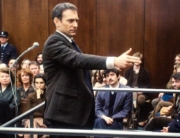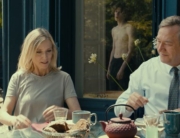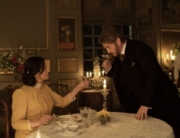The title of Justine Triet’s new film, the enigmatic Anatomy of a Fall, belies the high stakes at hand, given the plummet in question results in a young husband/father’s death. Perhaps Anatomy of a Murder would be a more apt title, except Otto Preminger had already taken that in 1959. More importantly, it’s questionable if an actual crime has been committed. For 150 minutes, the director/co-screenwriter takes an expansive approach, allowing scenes plenty of time to breathe and develop, and for more than enough doubts to seep in to obscure a definitive interpretation of events. Ambiguity conspicuously reigns supreme. So, expect many post-screening conversations, and some frustration, to ensue.
Sandra Voyter (Sandra Hüller), Samuel Maleski (Samuel Theis), and their son live high up in the snow-covered French Alps near Grenoble, without a neighbor in sight. They have returned to his country, but because the German-born Sandra doesn’t speak Samuel’s native tongue fluently, they speak English to each other and with 11-year-old Daniel (Milo Machado Graner), who is visually impaired. The fourth member of the polyglot household is Snoop, the devoted dog. Because the camera follows the wagging canine in the beginning, Triet (who directed the delightfully droll Sybil) puts viewers on notice that the dog will somehow play a role in the unraveling mystery.
In the succinct opening sequence, Sandra, an acclaimed novelist known for mixing truth with fiction, has sat down with a young female student for an interview in the living room. Their tête-à-tête is interrupted by the loud music blaring from the attic. Slightly flushed, Sandra explains that it is a repairman at work, yet she remains seated, as though biting her tongue. Because the women can’t hear each other, the sit-down is called off and the journalist leaves. However, it is not a repairman upstairs but Sandra’s husband, engaging in an act of passive aggressive behavior, one of many to come. Sandra is alone in the renovated chalet with Samuel upstairs, while Daniel and Snoop have gone out for a walk. When the boy returns home, he discovers his dad’s body lying face down in front of the house, with the side of his head bloodied, possibly bashed in.
Under questioning by police, Sandra theorizes that Samuel, who was a yet-to-be discovered novelist, fell out of one of the chalet’s top floor windows, and later, that he likely died by suicide. The authorities conclude otherwise: The cause of Samuel’s head trauma occurred before his body hit the snowy ground. That, and discrepancies in Sandra’s testimony, leads to her indictment for murder.
In a tactic as old as time, the prosecutors attack Sandra’s character, her skills as a wife and a mother, and her sexual history. She readily admits there was trouble in her marriage. A flashback to one raucous row—admitted as part of the prosecutor’s evidence—capsulates the tensions and competition within a modern couple, and becomes a mini-remake of Scenes from a Marriage.
This is not a whodunit in the procedural sense. For that, you would be better off with A Haunting in Venice. The focus remains within the dynamics of the household, from the couple’s relationship to Sandra’s tentative care for Daniel—it was Samuel who homeschooled the boy and who spent more time with him. The screenplay refrains from throwing in twists and red herrings, yet Triet and co-writer Arthur Harari come up with a bizarre, incredulous plot development involving Snoop the faithful dog that, on a closer look, reads more like a tidy way to push the intrigue along. It’s the weakest and wobbliest step the otherwise straightforward, just-the-facts storyline takes.
At a public Q&A with Sandra Hüller during the recent New York Film Festival, the actress mentioned that two days before shooting began, she asked Triet whether her character, Sandra, was guilty. The director provided no answer, so Hüller played the role believing Sandra’s innocence. The result: an (anti)heroine and this year’s Lydia Tár, a whip-smart intellectual who doesn’t suffer fools gladly, is unapologetically ambitious, and who perhaps lives by her own moral code. (Triet wrote the role for Hüller.) When Sandra testifies on the stand, it is fascinating to witness her squirm and then pivot on a dime, justifying her actions and adamantly defending herself.
Was the death of Samuel murder, suicide, or an accident? Warning: There may be no one iron-clad solution. However, this reviewer has a definite opinion of what actually happened. No spoiler alert is necessary, but watch for the director’s sleight of hand, especially in the sound design, for clues. The most crucial detail in solving the mystery may not actually center on Sandra, but on young Daniel and the actions he takes in regards to her. He is equally as cryptic as his mother.







Leave A Comment